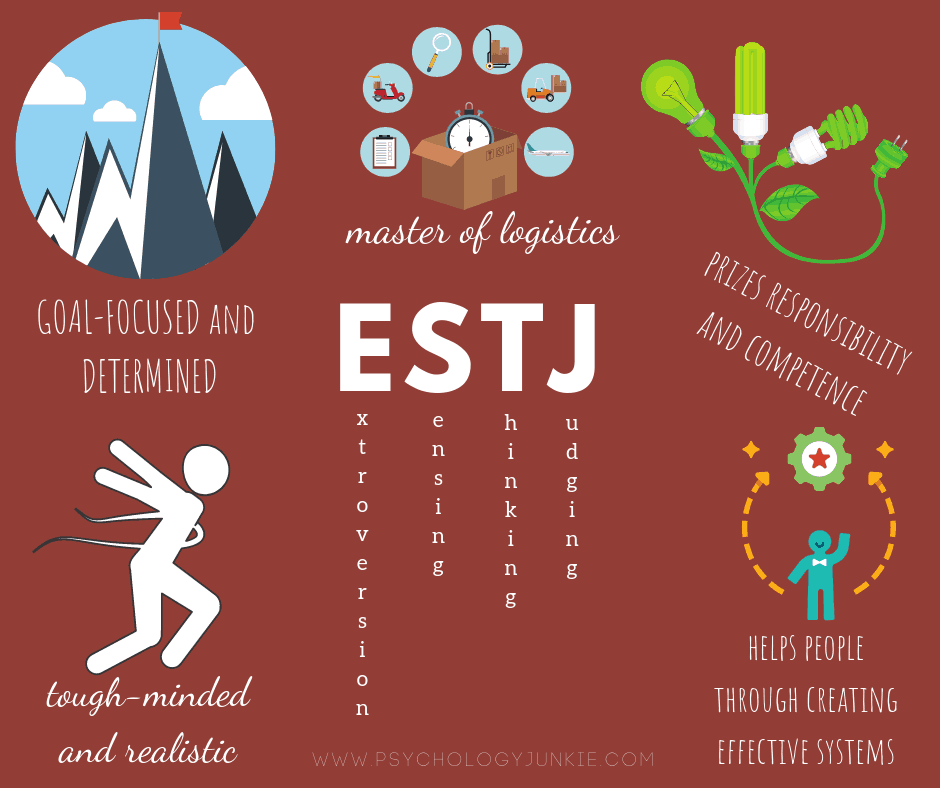What it Means to be an ESTJ Personality Type
The Efficient, Responsible Type
Detailed, Hard-Working, Structured, Logical
Not sure what your personality type is? Take our new personality questionnaire!

The ESTJ Personality Type in Brief
ESTJs approach life with a desire to organize it and make it more effective for everyone. They quickly notice what should be changed, critiqued, or structured in a way to make things more efficient and productive. They tend to organize people, as well as themselves, in order to achieve success. They do this not only because they enjoy getting things done, but because they believe effective, fair systems create a better world for everyone. Justice and fairness are of paramount importance in their lives and as such they believe that fair and equal rules need to be enforced so that the world is a safer, happier place.
ESTJs have many talents – they are often the supervisors, doctors, stock-brokers, teachers, and attorneys of the world. They are extremely detail-oriented and skilled at planning, inspecting, and leading. They can easily see when things are out of order and have an irresistible urge to organize information and ideas into an easy-to-follow format. This means that in group situations when people feel “stuck,” lost, or unsure of what to do they are able to come up with simplified, step-by-step plans for people to follow. They take care of people by noticing the details that are significant and compiling them into a practical plan of action. They are often trusted for their grounded, responsible, trustworthy nature.
Driving Force: To create order out of chaos. To achieve goals, segment, systematize, and organize in order to create efficiency.
Backup Strength: Skilled at reviewing and recalling impressions and details from the past. Use history, hindsight, and experience to optimize current and future situations.
Weaknesses: May ignore their own feelings in order to stay focused on goals and objectives. Can become convinced that their values are right for everyone and may be pushy or insensitive at times.
Stressors: Being out of control, being in emotionally-turbulent situations, unpredictability, disorder, having incompetent leadership, working with procrastinators, having their values violated.
The Meaning of the Four-Letter Code (in Brief)
E = Extroversion. ESTJs focus on the outer world of experiences, people, and events before focusing inwards.
S = Sensing. ESTJs focus more on the concrete, existing world than the world of theories and abstractions.
T = Thinking. ESTJs focus on the impersonal aspects of a decision (pros and cons, logic, cause and effect) before looking at personal impact and emotional dynamics.
J = Judging. ESTJs prefer having an organized, structured lifestyle. They tend to schedule their time and work before they play.
Famous Rumored ESTJs: Bernard Montgomery, Margaret Thatcher, Condoleezza Rice, Martha Stewart, Michelle Obama, Billy Graham, Tom Clancy, Courtney Cox, Alec Baldwin, Dr. Phil, Laura Schlessinger, Judge Judy, Daisy Ridley.
ESTJ Overview

One of the defining characteristics of the ESTJ personality type is their ability to take charge of seemingly chaotic situations. They can walk into a haphazard, incompetent business, for example, and quickly see which systems (and people) are slowing things down. They’ll put up schedules, guidelines, organize tools, and set up goals and accountability measures so that the business is able to become productive again. Organizing the world and being prepared gives them a strong sense of satisfaction and purpose. They don’t do all this simply to “be in charge” or have control, either. For the ESTJ there is a drive to take care of people through efficiency. They know the best way to meet the needs of the largest group of people is to have fair, working systems in place. They also believe that individuals should be held responsible for the impact they have on others. Reliability, hard-work, honesty – these are all things they value in themselves and others. In a world that is full of confusion, mixed-messages, and overall chaos, ESTJs hope to be grounded supports for their communities and loved ones.
ESTJs are people who have very nuanced and vivid impressions from the past. When they recall something they don’t remember just the cold, hard facts. They remember their emotions, the impression they got, the way something smelled, felt, or tasted. These “sense-impressions” stay with them and give them an appreciation for rituals, routines, and traditions that they want to re-experience as a way of commemorating those moments. Because of the vividness of their recollections, ESTJs are easily able to recall detailed data. They are firm believers in doing things right the first time! Because time is so important to them they hate the idea of wasting it. They also like to mark the passages of time with special traditions and rituals such as family gatherings, holiday meals, a special breakfast on the first day of school, or a restaurant they love to go on their anniversary. They aren’t only concerned with wasting time, they’re concerned with wasting an experience on something sub-optimal. They probably have favorite meals that they re-order again and again because they don’t want to waste money or time on an experience they can’t be certain of. They enjoy collecting and planning traditions that give their life a sense of meaning and continuity. They look forward to these special rituals and dates during their calendar year and they try to pay attention to habits and rituals that are important to other people.
Although ESTJs are extroverts they may not always seem chatty and social, like most stereotypes imply. They are very task-oriented so they may get restless if they aren’t working towards their goals. They will typically be more social, relaxed, and talkative after their work is finished. It’s important for ESTJs to be productive with their time and so they may not seem as gregarious and talkative as some other extroverted types.

At Their Best:
At their best, ESTJs have a clear vision, focus, and commitment to their goals. They lead by example and delegate effectively, leading their communities/workplaces/or teams to places of effective action. They make it a priority to hear others’ views and aim to be supportive and understanding in their decisions. They have a strong sense of objectivity about their decisions but are quickly able to see the strengths of people with opposite preferences. In fact, at this stage, they don’t mind going to people with opposite preferences and asking for their advice so that they can make more balanced decisions.
ESTJs at this level are hard-working and dependable, but they also know how to relax and enjoy the simpler pleasures in life. They are more open to their intuition and enjoy looking at different perspectives and brainstorming or imagining possibilities. They take time to carefully process information before making a decision, to ensure that they are being fair and reasonable. Healthy ESTJs are able to accept criticism, even if they don’t agree with it, with curiosity and open-mindedness.
At their most mature, ESTJs are driven towards results and goal-achievement, but they also realize that sometimes this can be ego-driven. They are more accepting of other people and their views and are skilled at gently encouraging people towards growth and development. They care about making sure their values are in line with their decisions and often have one or two causes that are very important to them (charities, political or religious causes, etc,.)
Average ESTJs:
At an average level, ESTJs are logically analytical, action-oriented, productive, consistent, and pragmatic. They have high standards for themselves and others and will go the extra mile to deliver on their promises and obligations. It’s important to them to be fair, direct, and encouraging. They can also be competitive and overbearing sometimes. Average ESTJs will accept criticism they agree with but may ignore or dismiss criticism they don’t agree with.
ESTJs at this level are generally very competent and effective in the workplace. Because they are so focused on goals and output they may be too hasty in their decisions. They may brush off alternatives or deeper analysis because they become overly-fixated on achieving an objective at a specific time. They can also develop a “know-it-all” attitude, and regard opposite preferences (N/F/P preferences) as weaknesses rather than strengths. They may give a lot of feedback or advice, but forget to offer praise or appreciation for things done well.
Unhealthy ESTJs:
At an unhealthy level, ESTJs tend to appear aggressive, domineering, and confrontational. They quickly notice inefficiencies and imperfections and can give very opinionated criticism of such things. They may be so focused on wrongs that need to be “righted” that they forget to see the good things that people are doing. They can intimidate people by being overpowering, condescending, and competitive. At this level, ESTJs will criticize anyone who criticizes them.
In the workplace, they like to be in charge and tend to micro-manage people under their control. Although they are diligent and hard-working, they also tend to be insensitive towards others, priding themselves on their “brutal honesty” without consideration for how it may impact people. If they feel insecure or overly stressed they may develop a martyr complex. During these moments they feel that everything is left to them, that they are the only dependable ones, and they build up an image of themselves as the one strong person having to do everything for everyone else. You can find out more about the unhealthy ESTJ here.
Personal Growth Recommendations for ESTJs
- Examine one of the goals you have for yourself and see how you can make it measurable. For example, change “I want to lose 50 lbs” to “I want to lose 1 lb. a week for the next 50 weeks. Every time I lose 5 lbs I will celebrate by going to a movie.”
- Take up a repeatable, calming physical activity. Something like knitting, gardening, crocheting, or playing solitaire. Notice how the repeated actions bring a sense of stability and calm to your body and mind.
- Think about a habit or routine that you have. In what ways could you do this differently? List the ways. Are any of them worth trying?
- When people come to you with a problem, actively listen to them and try to identify the values involved. After determining their values, try to think of solutions that would be consistent with their values. Validate their emotional experience.
- Think of a cause that aligns with your deepest personal values. Is there a way that you can support that cause using your gifts and abilities?

Want to find out more?
Check out these articles:
10 Things You Should Never Say to an ESTJ
The Top 7 Gift Ideas for ESTJs












Susan, I guess deep down we know who we really are and what we stand for, but having to face the reality of reading it, both pro’s and cons.
I give me a new understanding of how I can improve my quality of life. Thank you.
I wanted to thank you for sharing these detailed posts about some of the different MBTI types:) I noticed you created posts like this one ” What it means to be an XXXX personality type” for 9 of the types. I was wondering if you could make posts like those for: ISTP, ESTP, ISTJ, ESFJ, ENFJ, ENTJ, ENTP? I love that I can come to your site and find articles for so many different topics concerning MBTI types!! It has really helped me personally, as well as help me better understand and appreciate the different people in my life, and learn how to connect with them better!!
Thanks again, Kandy 🙂
Hi Kandy! Thanks for reaching out 🙂 I definitely want to get the rest of these profiles written for each type 🙂 So stay tuned! I’m so glad the site has helped you!! Thanks for the encouragement 🙂